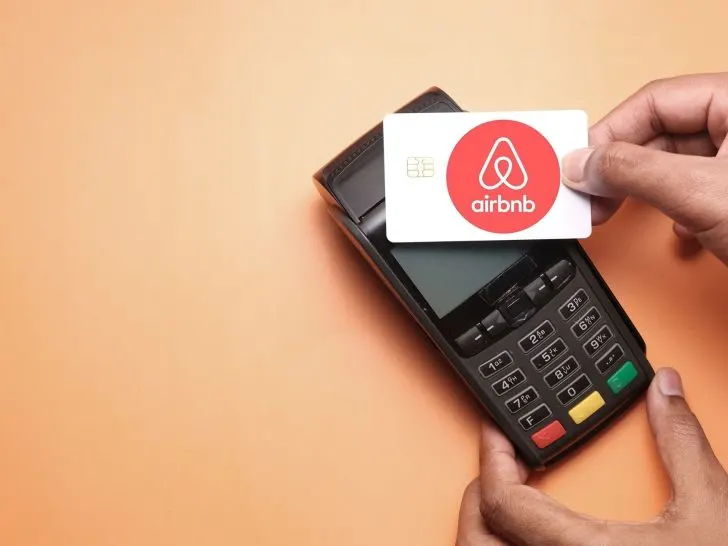Before listing a property on Airbnb potential hosts are likely weighing their options between multiple different platforms. The first thing you probably want to know is how much does Airbnb take as their cut of the total amount paid.
Before we answer that, I want to remind you that if your property listings don’t get any bookings than it doesn’t matter if another website has a lower fee. So, that obscure website offering a flat fee or guest paid fee structure is not as beneficial as it appears. You need bookings and that comes from website traffic, which means you want your place on Airbnb.
Understanding Airbnb’s Fee Structure
Airbnb implements a fee structure that affects both hosts and guests. It’s important to understand how these fees work to manage your expectations and budget effectively.
Airbnb Service Fees
For guests: Your service fee is a percentage of the booking subtotal. The exact amount can vary due to several booking factors.
For hosts: Typically, Airbnb charges you a host service fee of 3% of the booking subtotal, which is automatically deducted from your earnings.
Different Fee Structures
Airbnb has two main types of fee structures:
- Split-fee structure: This is most common where both hosts and guests are charged a service fee.
- Host-only fee: In some circumstances, the host may pay the entire service fee.
What Airbnb Charges
Wondering how much does Airbnb take? Service fee payments depend on the selected fee structure:
- Flat service fee: You’re charged a standard 3% as a host. Guests pay around 14.2%, though this can vary.
Ensure you review the pricing breakdown to see how Airbnb’s service fees impact your final cost. Understanding these details helps with planning your listings and stays on Airbnb.

The Host-Only Fee Structure
Airbnb has revised the way service fees are handled with a host-only fee structure. This means that the service fee is solely your responsibility as a host, with no direct fees charged to guests.
Benefits for Hosts and Guests
For hosts, the host-only option presents a streamlined pricing model. Your guests won’t have to pay the service fee, which can make your listing more appealing and could potentially increase bookings. This simplification means you can predict exactly how much does Airbnb take from each booking, without worrying about variable fees for guests.
For guests, this model offers greater transparency in pricing. By viewing a total cost without the addition of service fees, guests can make quicker, clearer decisions. It can enhance the overall customer experience and satisfaction with your service.
Pro Tip: Airbnb says hosts using Simplified Pricing saw a 17% increase in bookings
Comparing With Other Fee Models
Traditionally, Airbnb operated on a split-fee model where both hosts and guests paid service fees. In comparison, the host-only fee is generally between 14%-16% of the booking subtotal. For software-connected hosts using third-party software, this fee is mandatory, while Airbnb Plus hosts may see higher percentages. This total service fee is automatically taken from your earnings, and while it may seem higher, it consolidates all costs into a single deduction.
By centralizing fees to hosts, Airbnb aims for a simpler, more consistent billing process. This method aligns with traditional practices of other service providers where the host manages all related service costs.
The Split-Fee Structure
Under most circumstances for United States property owners, understanding the split-fee structure is key. This model impacts how much the guest and the host pay in service fees.
How Split Fees Work
The split-fee model is Airbnb’s most common fee structure. Under this model, both you and the host contribute to the service fees charged by Airbnb. Typically, hosts pay a 3% fee of the booking subtotal, which includes the nightly rate, cleaning fees, and any additional guest fees, before taxes and Airbnb fees. As a guest, you’d pay a higher service fee, usually around 14.2% of the booking subtotal.

Advantages of Split-Fee Model
Opting for the split-fee structure can be beneficial for the host because the Airbnb host fees are a simplified flat rate making bookkeeping easier. The shared approach ensures neither party bears the full commission fee, making listings more competitive. For guests, the transparency of this model allows them to see exactly how much does Airbnb take from the total reservation cost.
Additional Fees and Costs
When booking an Airbnb, the total cost will include more than just the nightly rate. These additional charges take into account the vast differences between a hotel and a vacation rental property.
Cleaning Fees
Hosts usually charge a cleaning fee to prepare their space for the next guest. This is a one-time fee applied per stay, not per night, and it covers the expenses related to cleaning the property after a guests departure. The amount can vary depending on the size of the listing and the host’s personal pricing strategy.
Some hosts subsidize the cost of the cleaning so that extra fees don’t look so high when comparing properties in the search results. But, the reality is that hiring a licensed, bonded, and insured cleaning company to clean every corner of a home including waiting around for numerous loads of laundry isn’t cheap.
Service Fees
Service fees are how much Airbnb takes to facilitate the platform’s operation. For guests, this fee usually falls below 14% and can vary depending on the booking details. Hosts typically pay a 3% service fee deducted from their earnings, which may increase in specific scenarios such as listings in Italy or for hosts with strict cancellation policies.
From a host perspective the split fee structure is essentially just a credit card processing fee being labeled as a service charge. As far as the Airbnb guest service fee, that is was allows Airbnb to offer customer support, provide insurance, maintain servers, and pay for new accommodations in the event something goes very very wrong on someone’s trip.
Security Deposits
For some bookings, hosts may require a security deposit. This is not charged upfront but is a reserved amount that you might need to pay if there is damage to the property during your stay. The criteria for triggering this cost and the amount are set by the host.
Additional Fees
Remember, the final price may also include additional guest fees if you exceed the number of guests a listing accommodates without extra charges. There are instances where properties charge fees for heating a swimming pool, using a hot tub, or gaining access to an additional space on the property. Also, local taxes may apply depending on the region of your stay, leading to additional costs not included in the listing price.

How Rates and Fees Impact Your Earnings
When you list your property on Airbnb, understanding how much money you’ll actually make is crucial. Your earnings are a sum of your nightly rate and any extra charges you impose—for example, a cleaning fee or extra guest fee. Yet, these earnings are not the entire picture, as you’ll need to subtract the costs that Airbnb charges.
Airbnb’s Host Service Fee Airbnb typically charges you, the host, a service fee of about 3% of the booking subtotal. This subtotal comprises your nightly rate, any additional fees you’ve added, and the cleaning fee.
| Revenues | Deductions | Net Host Payout |
|---|---|---|
| Nightly Rate | Host Service Fee (3%) | |
| Cleaning Fee | ||
| Extra Guest Fee | ||
| Additional Fees | Your Payout |
The good news is that calculating your takeaway is straightforward. Just add up your charges, deduct Airbnb’s fee, and you’ll see how much does Airbnb take from your total. Guests pay a separate service fee, typically around 14% of the booking subtotal, which does not affect your payout.
Your payout is the final amount that lands in your pocket after Airbnb’s deductions. Pay attention to your pricing strategy because the higher your charges, the more extra money you can anticipate, even after fees.
Remember, Airbnb also provides a detailed breakdown of earnings and fees on your Host dashboard, making it easy for you to track how much money you’ve made on each booking.

Managing Financial Expectations
When considering becoming an Airbnb host, understanding how much Airbnb takes from your earnings and preparing for taxes are crucial. The financial institution Airbnb uses for payment processing will be required to issue tax documents in some instances, so don’t get caught without reporting this income.
Planning for Taxes
Airbnb income is taxable, and as a potential host, you should set aside a portion of your earnings for tax purposes. Keep meticulous records of your income and expenses related to your Airbnb business. This includes all booking fees, cleaning costs, home repairs, and supplies. Depending on your location, you may need to pay occupancy taxes, income taxes, or both, so consult with a tax professional to ensure you’re saving the correct amount. Remember, Airbnb reports your earnings to tax authorities, so maintaining an accurate transaction history is imperative for smooth tax season processing.
Comparison with Other Listing Platforms
When exploring the landscape of online vacation rental marketplaces, you’ll notice that Airbnb is a major player. Still, it’s important to compare how much does Airbnb take from hosts with other popular platforms. Let’s take a closer look.
Airbnb: It’s known for its ease of use and wide reach, with a fee structure that typically takes a percentage of each booking. This can range from host-only fees to split fees between hosts and guests.
Vrbo: Another giant in the field, Vrbo’s fee system is similar to Airbnb, with some variations depending on the type of listing and other factors. They also provide options for subscription-based listings.
Booking.com: As a direct booking website, it operates on commission-based fees that might differ from Airbnb’s, targeting a different segment of the market.
For your rental property, each platform offers different advantages:
- Direct bookings: These typically avoid the commission fees but may require more marketing effort on your part.
- Airbnb and counterparts: They offer vast networks and visibility, potentially higher traffic volume, but at the cost of the fees they charge.
Remember to weigh the reach and resources each booking platform provides against the fees they charge for your rental properties. This balance will be crucial in deciding the best avenue for your vacation rental business.
Navigating Airbnb’s Policy Updates
When dealing with Airbnb’s service charges and cancellations, it’s essential to understand how much Airbnb takes from each booking.
Property managers and owners face strict cancellation policies that protect both them and guests. Airbnb’s super strict cancellation policies are designed to offer a clear framework for cancellations and associated fees. If you’re concerned about cancellation fees, review the policy details to see the tiered fee structure for canceling reservations under different circumstances.
As you navigate through the Airbnb platform, remember that policy updates aim to balance the interests of guests with your needs as a host.

For Hosts Is Airbnb Worth It?
As an Airbnb host myself I would advise that utilizing Airbnb is absolutely worth it. The Airbnb pricing structure is essential for them to be a sustainable business. In the beginning I told you that lower fees but less bookings on an obscure website was not a great way to go and hopefully now you understand why.
Airbnb is the largest vacation rental platform on Earth. People don’t say they are going to book a ‘vacation rental’ for their trip, they say they are going to book an ‘Airbnb’ for their family trip. Airbnb provides the most bookings and let’s you do what you do best, provide amazing accommodations.



Leave a comment